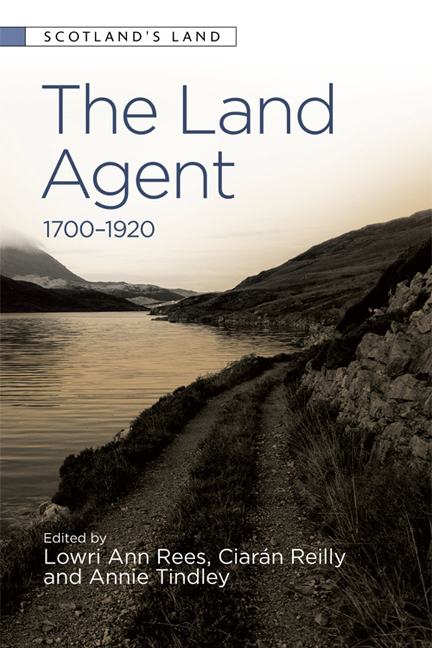Book contents
- Frontmatter
- Contents
- List of Figures
- Acknowledgements
- Notes on the Contributors
- Map of the British and Irish Isles
- Introduction
- Part I Power and its Constructions on Landed Estates
- 1 ‘Stirring and advancing times’: Landlords, Agents and Improvement on the Castle Howard Estate, 1826–66
- 2 ‘Not a popular personage’: The Factor in Scottish Property Relations, c. 1870–1920
- 3 The Factor and Railway Promotion in the Scottish Highlands: The West Highland Railway
- Part II The Transnational Land Agent: Managing Land in the Four Nations and Beyond
- Part III Challenges and Catastrophe: The Land Agent under Fire
- Part IV Social Memory and the Land Agent
- Postscript
- Index
2 - ‘Not a popular personage’: The Factor in Scottish Property Relations, c. 1870–1920
from Part I - Power and its Constructions on Landed Estates
Published online by Cambridge University Press: 11 August 2018
- Frontmatter
- Contents
- List of Figures
- Acknowledgements
- Notes on the Contributors
- Map of the British and Irish Isles
- Introduction
- Part I Power and its Constructions on Landed Estates
- 1 ‘Stirring and advancing times’: Landlords, Agents and Improvement on the Castle Howard Estate, 1826–66
- 2 ‘Not a popular personage’: The Factor in Scottish Property Relations, c. 1870–1920
- 3 The Factor and Railway Promotion in the Scottish Highlands: The West Highland Railway
- Part II The Transnational Land Agent: Managing Land in the Four Nations and Beyond
- Part III Challenges and Catastrophe: The Land Agent under Fire
- Part IV Social Memory and the Land Agent
- Postscript
- Index
Summary
THE BAPTISM OF ANGUS MACKINTOSH, 1910
IN HIS IMPORTANT POEM about history and memory in the crofting township in which he was brought up – Idrigill on the Kilmuir estate in the north end of the island of Skye – Aonghas MacNeacail tells of the day
cha b’ eachdraidh ach cuimhne
an latha bhaist ciorstaidh am bàillidh
lu mùn à poit a thug i bhon chulàist
(it wasn't history but memory / the day kirsty baptised the factor / with piss from a pot she took from the backroom).The context for this singular anointment was a dispute between the crofters and the estate management over part of a farm, Scuddaburgh, which the crofters claimed for their own use, against the wishes of the proprietors. The lease of the farm tenant, Murdo Gillies, came to an end in 1907; the crofters demanded the whole of the farm, while the proprietors offered them only part of it and wished to retain the rest as a small model farm. The dispute was long-running and, remarkably, was only settled with the personal intervention of Lord Pentland, the Secretary for Scotland, who convened a meeting in the Free Church in Uig. The unfortunate factor was a man called Angus Mackintosh, a Gaelic speaker, who had been brought in by the proprietors in the hope that he would have the skills and outlook to be able to communicate in an effective manner with the crofters. Mackintosh came from Daviot, south of Inverness, and after studying law at the University of Edinburgh held factorial posts in Fife and for Lady Gordon Cathcart in South Uist, Benbecula and Barra. Things did not go according to plan. Indeed, the bitterness of the dispute can be explained, at least in part, by the widespread feeling that the land of Scuddaburgh farm had been ‘promised’ to the crofters of Idrigill by Mackintosh. The crofters had taken illegal possession of the disputed part of the farm and the landowner had taken out interdicts against them. When these were breached, Mackintosh was called upon to identify to the Sheriff Officer those whom he thought had broken their terms.
- Type
- Chapter
- Information
- The Land Agent , pp. 39 - 55Publisher: Edinburgh University PressPrint publication year: 2018



